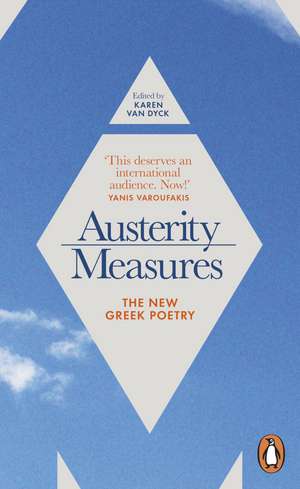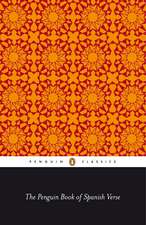Austerity Measures: The New Greek Poetry
Autor Karen Van Dycken Limba Engleză Paperback – 6 apr 2016
each other's hair. We had no sense that
anything else existed'
- Elena Penga, 'Heads'
'Nothing, not even the drowning of a child
Stops the perpetual motion of the world'
- Stamatis Polenakis, 'Elegy'
Since the crisis hit in 2008, Greece has played host to a cultural renaissance unlike anything seen in the country for over thirty years. Poems of startling depth and originality are being written by native Greeks, émigrés and migrants alike. They grapple with the personal and the political; with the small revelations of gardening and the viciousness of streetfights; with bodies, love, myth, migration and economic crisis.
In Austerity Measures, the very best of the writing to emerge from that creative ferment - much of it never before translated into English - is gathered for the first time. The result is a map to the complex territory of a still-evolving scene - and a unique window onto the lived experience of Greek society now.
Preț: 107.29 lei
Nou
Puncte Express: 161
Preț estimativ în valută:
20.53€ • 21.49$ • 17.09£
20.53€ • 21.49$ • 17.09£
Carte disponibilă
Livrare economică 10-24 martie
Livrare express 21-27 februarie pentru 22.84 lei
Preluare comenzi: 021 569.72.76
Specificații
ISBN-13: 9780241250624
ISBN-10: 0241250625
Pagini: 496
Dimensiuni: 126 x 181 x 32 mm
Greutate: 0.31 kg
Editura: Penguin Books
Colecția Penguin
Locul publicării:London, United Kingdom
ISBN-10: 0241250625
Pagini: 496
Dimensiuni: 126 x 181 x 32 mm
Greutate: 0.31 kg
Editura: Penguin Books
Colecția Penguin
Locul publicării:London, United Kingdom
Notă biografică
Karen
Van
Dyck
is
the
Kimon
A.
Doukas
Professor
of
Modern
Greek
Literature
in
the
Classics
Department
at
Columbia
University.
She
writes
on
Modern
Greek
and
Greek
Diaspora
literature,
and
gender
and
translation
theory.
Her
translations
include
her
edited
and
co-edited
collections:The
Rehearsal
of
Misunderstanding:
Three
Collections
by
Contemporary
Greek
Women
Poets(Wesleyan,
1998);A
Century
of
Greek
Poetry(Cosmos,
2004);The
Scattered
Papers
of
Penelope:
New
and
Selected
Poems
by
Katerina
Anghelaki-Rooke(Graywolf,
2009),
a
Lannan
Translation
selection;
andThe
Greek
Poets:
Homer
to
the
Present(Norton,
2010).
Recenzii
Austerity
is
a
self-defeating
economic
policy
which
has
taken
an
ugly
toll
in
Greece.
The
silver
lining
is
that,
along
with
the
mass
unemployment
and
the
rise
of
Nazism
that
it
engendered,
austerity
also
occasioned
a
cultural
renaissance.
This
volume
of
multilingual
poetry
is
a
splendid
example:
living
proof
that
the
Greek
crisis
is
of
global
significance.
It
deserves
aninternational
audience.
Now!
"Wherever I go, Greece wounds me," said George Seferis, the Nobel prize-winning poet born in 1900. There have been wonderful generations of Greek poets since his day. Ancient Greek poems, the Classics, are the basis of Western poetry. For Anglophone readers, they need re-voicing in every generation: brilliant English versions of Homer, from James Joyce to Derek Walcott and Alice Oswald, help us re-hear them. Today's Greek poets, however, have a special relationship, of a peculiarly charged and conflicted intimacy, with these founding texts. The light these poets work in, and the language they speak, are still the light and the language of Homer and the great tragedians.Austerity Measures, appearing as Greece faces new difficulties and suffering, offers a newly poignant, imaginative and resonant body of work. The wonderfully inventive translations reveal a different Greece to English readers: one that does not cancel the past but builds upon it
One of the few benefits of turbulent historical moments is that they tend to give rise to a new cultural efflorescence. Nowhere is this more obvious than in this fascinating anthology, which gathers together a remarkably rich, resourceful range of poetic idioms in response to a common sense of moral and political emergency
Karen Van Dyck has collected an extraordinary group of poets and translators who are bound to put Greek poetry on the map again. I've seen it happen twice in my life: with the Generation of the Thirties that included Cavafy, Seferis, Elytes and Ritsos, and that reached world recognition; and again, during the Dictatorship of the Colonels, when the group that appeared in the Harvard anthologyEighteen Texts(1972) and others living under censorship earned international recognition with the help of accomplished translators. Now, during another crisis in the country, we find exciting new voices emerging, and I am convinced that they are once again saying something no one else is saying. Call it the knowledge that emerges from the underside of devastation and the creative illumination that comes with tragedy, but something is going on in Greece that we aren't seeing in the news. I give this anthology my strongest support
Karen Van Dyck'sAusterity Measuresis a timely trove of new Greek voices that reverberates with urgency and authority, girded with hard-earned truth and a deep seeing necessary for our twenty-first century. Here's a language that goes for the gut and the heart, an earthy sonority. It holds us accountable for what we witness and feel in a time of globalism. This marvellous compendium of lived imagery speaks freely
"Wherever I go, Greece wounds me," said George Seferis, the Nobel prize-winning poet born in 1900. There have been wonderful generations of Greek poets since his day. Ancient Greek poems, the Classics, are the basis of Western poetry. For Anglophone readers, they need re-voicing in every generation: brilliant English versions of Homer, from James Joyce to Derek Walcott and Alice Oswald, help us re-hear them. Today's Greek poets, however, have a special relationship, of a peculiarly charged and conflicted intimacy, with these founding texts. The light these poets work in, and the language they speak, are still the light and the language of Homer and the great tragedians.Austerity Measures, appearing as Greece faces new difficulties and suffering, offers a newly poignant, imaginative and resonant body of work. The wonderfully inventive translations reveal a different Greece to English readers: one that does not cancel the past but builds upon it
One of the few benefits of turbulent historical moments is that they tend to give rise to a new cultural efflorescence. Nowhere is this more obvious than in this fascinating anthology, which gathers together a remarkably rich, resourceful range of poetic idioms in response to a common sense of moral and political emergency
Karen Van Dyck has collected an extraordinary group of poets and translators who are bound to put Greek poetry on the map again. I've seen it happen twice in my life: with the Generation of the Thirties that included Cavafy, Seferis, Elytes and Ritsos, and that reached world recognition; and again, during the Dictatorship of the Colonels, when the group that appeared in the Harvard anthologyEighteen Texts(1972) and others living under censorship earned international recognition with the help of accomplished translators. Now, during another crisis in the country, we find exciting new voices emerging, and I am convinced that they are once again saying something no one else is saying. Call it the knowledge that emerges from the underside of devastation and the creative illumination that comes with tragedy, but something is going on in Greece that we aren't seeing in the news. I give this anthology my strongest support
Karen Van Dyck'sAusterity Measuresis a timely trove of new Greek voices that reverberates with urgency and authority, girded with hard-earned truth and a deep seeing necessary for our twenty-first century. Here's a language that goes for the gut and the heart, an earthy sonority. It holds us accountable for what we witness and feel in a time of globalism. This marvellous compendium of lived imagery speaks freely














